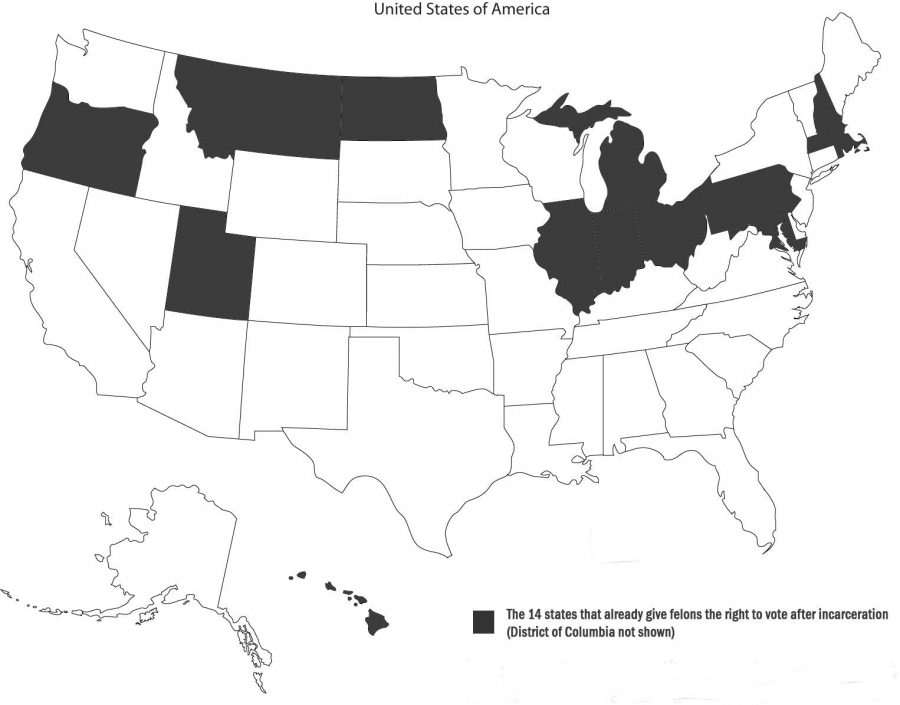Does a human being locked behind bars have the same rights as one walking free?
As the presidential election draws near, many people have begun to debate the issue of felon voting.
Felons’ right to vote, or lack thereof, vary tremendously from state to state. This tangled web of varying state laws is too complex and creates confusion.
According to the National Conference of State Legislatures’ website, ncsl.org, in Maine and Vermont, felons never lose their right to vote, even while they are incarcerated. In Florida, Iowa and Virginia, felons and ex-felons permanently lose their right to vote, although Virginia and Florida have supplementary programs which enable gubernatorial pardons. The remaining states, including Texas, each have their own approaches to the issue.
Most felons are unfamiliar with the laws of their state. Many believe they’ve permanently lost their right to vote, though this is rarely the case.
According to procon.org, 14 states, plus our nation’s capital, return a felon’s voting rights as soon as incarceration ends. Four states won’t restore a felon’s voting rights until the felon completes incarceration and parole. Texas is among the 19 states that only reinstate a felon’s right to vote after incarceration, parole, and probation have been completed.
How is anyone, especially those incarcerated, supposed to keep up with this crazy quilt of laws that vary from state line to state line?
The process needs to be simplified. All people being released from all prisons should be informed of and understand their rights, and more so, have their right to vote automatically reinstated.
In the current system, ex-offenders are essentially being told that their voice does not matter – that though they are American citizens, their views on how America should be governed are both unwanted and unnecessary.
Some might say that by breaking the law, these citizens lost those rights. But if the justice system that society has trusted to determine their innocence, or rather, lack thereof, now deems them fit to reenter society, why should society then make it difficult for them to do so?
Felons already face many barriers upon release, and reinstatement of their voting rights shouldn’t be one of them.
Many can’t get a job because of their background, leading them feeling as if they have no choice to turn back to criminal activity. Maybe if these individuals felt more like valued citizens who have something positive to contribute, instead of good-for-nothing rejects, fewer of them would return to a life behind bars.
Until these issues are addressed, millions of U.S. citizens will never regain the rights that so many take for granted.
According to procon.org, 2.5 percent of the American population in 2010 lost their right vote due to a felony conviction. That’s might not seem like a lot, but it’s almost six million people!
More than 10 percent of Florida’s voting population is disenfranchised. As a swing state, imagine how outcomes of presidential elections might have changed had these citizens been able to vote.
America cannot truly call itself a democratic nation until all of its citizens, regardless of race, gender, and yes – criminal background – have a voice in who governs it.









![Pippin, played by Hunter Heart, leads a musical number in the second act of the musical. [Photo courtesy Kris Ikejiri]](https://therambler.org/wp-content/uploads/2025/04/Pippin-Review-1200x800.jpg)
![Harriet and Warren, played by Trinity Chenault and Trent Cole, embrace in a hug [Photo courtesy Lauren Hunt]](https://therambler.org/wp-content/uploads/2025/02/lettersfromthelibrary_01-1200x800.jpg)
![Samantha Barragan celebrates following victory in a bout. [Photo courtesy Tu Pha]](https://therambler.org/wp-content/uploads/2025/05/20250504_164435000_iOS-834x1200.jpg)





![Hunter Heart (center), the play's lead, rehearses a scene alongside other student actors. [Photo courtesy Jacob Sanchez]](https://therambler.org/wp-content/uploads/2025/04/thumbnail_IMG_8412-1200x816.jpg)
![Student actors rehearse for Pippin, Theatre Wesleyan's upcoming musical. [Photo courtesy Jacob Rivera-Sanchez]](https://therambler.org/wp-content/uploads/2025/04/Pippin-Preview-1200x739.jpg)
![[Photo courtesy Brooklyn Rowe]](https://therambler.org/wp-content/uploads/2025/05/CMYK_Shaiza_4227-1080x1200.jpg)

![Lady Rams softball wraps up weekend against Nelson Lions with a victory [6 – 1]](https://therambler.org/wp-content/uploads/2025/04/Screenshot-2025-04-04-100924-1200x647.png)
















